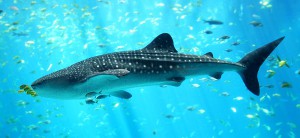Podcast: Play in new window
BOB HIRSHON (host):
Tracking sharks’ eating habits. I’m Bob Hirshon and this is Science Update.

Managing ocean fisheries requires tracking fish behavior—where are they moving and what other fish are they eating? David Shiffman is a doctoral student studying sharks at the University of Miami.
DAVID SHIFFMAN (University of Miami):
Sharks are very important to the healthy functioning of an ocean ecosystem, and the ocean ecosystem is something that is really important to the health and well-being and economic activity throughout the United States.
HIRSHON:
Up to now, the only way to know what a shark’s been eating is to kill it and look into its stomach—not ideal, when so many species of shark are endangered. Shiffman’s studying a new method that takes a small bit of muscle tissue, and analyzes levels of naturally occurring isotopes. Species have unique signatures of these rare atoms, so the analysis reveals what fish the shark’s been eating—critical information in managing complex ocean ecosystems. I’m Bob Hirshon, for AAAS, the science society.
